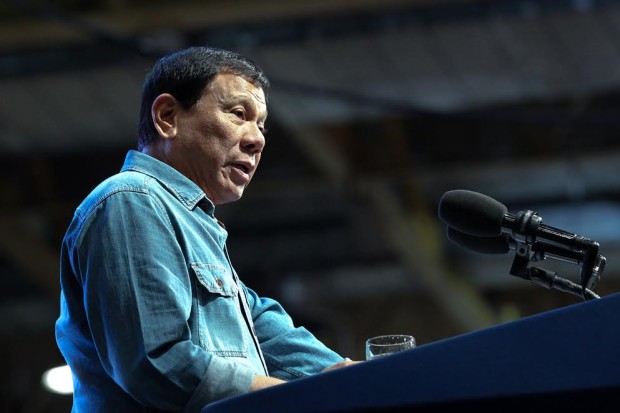
President Rodrigo Roa Duterte during the 10th Philippine Councilors League National Congress at the World Trade Center in Pasay City on March 8, 2017. RICHARD MADELO/Presidential Photo
It’s unlikely that President Duterte’s wish of seeing daily executions of convicts will happen during his presidency, assuming the death penalty bill is enacted into law, a minority lawmaker said on Thursday.
Buhay Rep. Lito Atienza, a prolife crusader who argued against the proposed law, said there simply was not enough time for “judicial executions” to occur within President Duterte’s six-year term.
“Even assuming the Senate caves in, and approves its version of the bill quickly, we seriously doubt there would be any judicial executions at all while Mr. Duterte is in office,” Atienza said in a statement.
Once the bill reintroducing the death penalty is enacted, the Department of Justice would need at least another six months to draw up a new Manual of Execution, he said.
“And this manual will surely be challenged before the Supreme Court, without prejudice to other lawsuits (against the death penalty),” said the former Manila mayor.
The House, voting 217-54 with one abstention, approved on third and final reading on Tuesday the bill restoring the death penalty for major illegal drug offenses. The bill states that executions shall be carried out by hanging, lethal injection or firing squad.
Mr. Duterte earlier vowed daily executions once Congress passed a law reimposing capital punishment. “Restore it and I will execute criminals every day—five or six. That’s for real,” President Duterte said in December.
But that may be wishful thinking on the President’s part, according to Atienza.
“Even if we have a new capital punishment law by June, based on our projections, the initial death row inmates with final judgments won’t come in until around mid-2022, or by the end of the President’s term, without counting potential delays due to adverse lawsuits,” he said.
The seven convicts put to death via lethal injection during Joseph Estrada’s presidency were all executed some five years after they committed their offenses, he said.
Citing government records, he said Leo Echegaray, Eduardo Agbayani, Dante Piandiong, Archie Bulan, Jesus Morallos, Pablito Andan and Alex Bartolome were executed one after the other an average of 61 months after they perpetrated the crimes for which they were condemned.
Except for Bartolome who was executed in 2000 for a felony committed in 1995, Atienza said the rest of the convicts were put to death in 1999 for offenses done in 1994.
It took around five years for the cases against the offenders to be resolved from the time the crime was committed all the way up to the review of the judgments against them by the Supreme Court and the Office of the President, Atienza said.
Following a six-year halt to executions, Congress finally passed a law abolishing the death penalty in 2006.